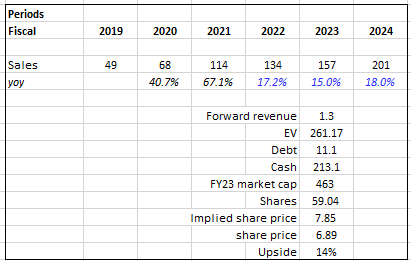Hispanolistic/E+ via Getty Images
Summary
I recommend going long CS Disco (NYSE:LAW) for a potential 14% upside over a one-year period. The company’s solutions are built to address the growing demand for legal services and the increasing complexity of the legal environment by using technology to increase lawyer productivity.
Company overview
CS Disco, Inc. offers SaaS options for businesses. The company’s cloud-based, AI-powered legal solution streamlines ediscovery, legal document review, and case management for businesses, law firms, legal service providers, and governments.
It is time for the legal industry to be digitalized
The rule of law is an important part of society. It affects everyone, from large corporations to SMEs, and from large civic groups to individual citizens. Governmental bodies and corporations rely on the stability provided by the law. Institutional definition, business transaction facilitation, and primary regulatory and dispute resolution mechanisms are all functions it plays in today’s world. Private parties, through contracts, and governmental bodies all over the world create and alter legal obligations every day. With the opioid crisis, litigation over national elections, and the emergence of new business models like the booming gig economy, I believe the influence of law on business will only grow in the years to come.
In my opinion, lawyers can now be more efficient, have better results in the courtroom, and better uphold the rule of law thanks to automation and AI. As a result, the legal sector can catch up to other sectors in terms of technological advancement. The legal sector has been slow to adopt digital and cloud technologies, despite the size of the sector and the sophistication of enterprise clients. This is because, in my opinion, it is hard for legacy solution providers to adapt to modern technology while also understanding how legal workflows work, and the industry relies heavily on bill-by-the-hour professional services.
As the need for legal assistance and the complexity of the legal landscape continue to rise, the legal sector is beginning to embrace technological advancements. Transformative legaltech applications can now be built on top of foundational technologies like cloud computing and AI. As a result of the COVID-19 pandemic, legal departments and law firms have had to make changes to support remote work and collaboration. This has sped up the adoption of legal technology, especially cloud-based solutions.
Due to the massive amount of data and the growth in volume, variety, and velocity, I believe that the process of gathering, seeking, and evaluating enterprise data for documentary evidence is extremely time-consuming and complex. In the past, businesses had to choose between a small number of on-premise databases and a handful of paper records to store their data. Electronic data is a byproduct of virtually every modern business activity. This, I believe, is driving legal departments to adopt cutting-edge technological solutions that can efficiently collect, search, and evaluate a wide variety of enterprise data without sacrificing precision, velocity, or safety.
LAW offers an end-to-end solution that is built for lawyers
LAW, in my opinion, provides a one-stop shop for both ediscovery and artificial intelligence-driven legal document review by way of its DISCO Ediscovery and DISCO Review products. The LAW team can handle all or a portion of a client’s ediscovery and legal document review, while the client retains the right to handle other aspects of the process in-house or through the use of third-party law firms and legal service providers. Regular users of LAW’s solution for AI-powered legal document review provide invaluable, real-time feedback that speeds up product development and enhances the product for everyone who uses it.
In addition to being a cloud-native AI solution, LAW also offers in-depth knowledge, professional services, and customer support. As a one-stop shop with a strong internal feedback loop, LAW is able to steadily improve the strategic value of what they offer to clients.
Furthermore, LAW’s services cater to lawyers because that is their primary audience. At each and every stage of development, LAW incorporates the knowledge of both in-house legal experts and end-users. In my opinion, this is crucial because it allows LAW to learn about and prepare for the needs of legal professionals in order to speed up and enhance their work and to create solutions that are intuitive and easy to incorporate into their existing routines.
Scalable solution with strong network effects
The cloud-based nature of the LAW solution architecture makes it more cost-effective and less resource-intensive to use than the more conventional methods of acquiring software. What LAW did was build a flexible application architecture on top of its solution, which allowed for the reuse of solution capabilities, which in turn increased innovation and decreased the time and resources needed to develop new features and programs. In addition, the cutting-edge cloud solution streamlines product development by making it easy to incorporate the most recent advancements in modern solutions developed by other stakeholders in the ecosystem.
In my opinion, LAW solutions not only have the potential for rapid and efficient scaling but also possess powerful AI models that can be applied to a wide variety of legal matters. I believe the AI model should improve over time as it is exposed to more data and gains insights into what is done with that data. In my opinion, LAW’s solution makes it simple for legal departments to collect, act on, retain, and reuse enterprise data for ongoing legal work thanks to LAW’s capacity to serve as a safe, unified hub for all of our customers’ legal data and engagement needs, aided by AI. I think this is a major contributor to the powerful network effect and increasing competition in the LAW market. due to the fact that the more people who use LAW’s services, the more data and legal work product LAW has access to, which in turn improves the quality of their AI models and increases the value they provide to their clientele.
In sum, the LAW solution can turn a company’s legal information from a weakness into an asset.
Effective business model that drives adoption
The usage-based pricing and straightforward nature of LAW’s business model make it simple for customers to adopt the solution, scale up or down as their needs evolve, and even recommend LAW to their colleagues in the legal industry. In my opinion, the solution’s ease of use, rapid time to value, and scalability, as well as the usage-based nature of LAW’s business model, make it an attractive option for legal application developers.
Moreover, I believe that the LAW solution’s value, reach, and ability to efficiently acquire new customers are all enhanced by the viral properties and potent network effects that underpin this business model. For instance, the business model makes it possible for any size customer to quickly and easily implement solutions for a limited number of legal needs. Once clients see the value in using the solution, they are more likely to adopt additional LAW solutions and use the solution for a wider range of legal issues. I believe that the strategic value and stickiness of LAW’s solution increase as a customer uses it more, as more of the customer’s enterprise data related to legal matters is stored in LAW’s solution, and as more of the customer’s users become familiar with LAW’s applications.
Even more so, as was already mentioned, LAW greatly benefits from network effects. As more lawyers adopt LAW, use it for a wider variety of use cases, and distribute it to a wider audience, the volume, and variety of data collected and processed by LAW increases. From my perspective, this is beneficial to both LAW and its clientele in a number of ways. Clients save both time and money by not having to re-enter the same information into multiple systems; this is made possible by LAW’s ability to act as a centralized hub for all client and matter-related information. Also, as LAW grows, its AI models get better as they learn from more data and see more work done on that data. This makes it easier for customers to find evidence faster. I think the value of LAW’s solution will increase as the volume of data it can manage and the amount of work that lawyers can perform in LAW both grow.
Valuation
According to my model, LAW is undervalued. At this price, investors can expect a 14% return over a one-year period.
My model assumption is based on management’s FY22 revenue guidance and my belief that the company can continue to grow in the high teens in the future. Given the weak macroeconomic environment, I expected FY23 to be a year of slower growth. One critical assumption is the price at which LAW will trade in FY23. LAW is currently trading at 1.3x forward revenue, which is 8x lower than its historical average. Assuming that LAW trades at 1.3x forward revenue, it is worth $7.85 in FY23.
Own calculations
Risk
Digitalization might not be a top priority for many firms yet
As one might expect, law firms exist to fight legal cases, and there are a plethora of cases out there for a limited number of law firms to address. My greatest fear is that, while the LAW solution is excellent, it will never be a significant priority for law firms simply because existing solutions can still be effective. As a result, while LAW TAM is enormous, the rate of growth may be slower than expected.
Competition
LAW is not the only one doing this in the market. There is a lot of variety, rivalry, and flux in the market for legal technology services. The vast majority of businesses that might be interested in LAW services already have ediscovery and legal document review solutions in place. These services are typically provided by a mix of on-premise point solutions and human professional service providers. Competitors include large international firms like Consili and Epiq Systems as well as smaller regional and local ones like Deloitte and KPMG.
Conclusion
I believe LAW has a 14% upside. The company’s solution aims to bring the legal industry in line with other industries in terms of technological transformation, improving lawyer productivity and legal outcomes. More importantly, the solution is built for lawyers and provides end-to-end support for ediscovery and legal document review.


Be the first to comment